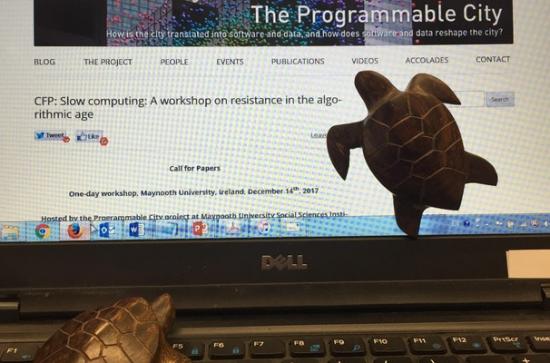
In line with the parallel concepts of slow food (e.g. Miele & Murdoch 2002) or slow scholarship (Mountz et al 2015), ‘slow computing’(Fraser 2017)is a provocation to resist. In this case, the idea of ‘slow computing’ prompts users of contemporary technologies to consider ways of refusing the invitation to enroll in data grabbing architectures – constituted in complex overlapping ways by today’s technology services and devices – and by accepting greater levels of inconvenience while also pursuing data security, privacy, and even a degree of isolation from the online worlds of social networks.
The case for slow computing arises from the emerging form and nature of ‘the algorithmic age.’ As is widely noted across the sciences today (e.g. see Boyd & Crawford 2012; Kitchin 2014), the algorithmic age is propelled forward by a wide range of firms and government agencies pursuing the roll-out of data-driven and data-demanding technologies. The effects are varied, differentiated, and heavily debated. However, one obvious effect entails the re-formatting of consumers into data producers who (knowingly or unwittingly) generate millions of data points that technology firms can crunch and manipulate to understand specific markets and society as a whole, not to mention the public and private lives of everyday users. Once these users are dispossessed of the value they help create (Thatcher et al 2016), and then conceivably targeted in nefarious ways by advertisers and political campaigners (e.g. see Winston 2016), the subsequent implications for economic and democratic life are potentially far-reaching.
As such, as we move further into a world of ‘big data’ and the so-called ‘digital economy,’ there is a need to ask how individuals – as well as civil society organizations, small firms, small-scale farmers, and many others – might continue to make appropriate and fruitful use of today’s technologies, but while also trying to avoid becoming another data point in the new data-aggregating market. Does slow computing offer a way to navigate the algorithmic age while taking justice seriously? Can slow computing become a part of diverse strategies or tactics of resistance today? Just what are the possibilities and limitations of slow computing?
This one-day workshop will discuss these and other questions about slow computing.
FAQs
How can I contact the organiser with any questions?
Please contact MUSSI@MU.IE
How do I reserve a place?
See eventbrite for ticket availability -
